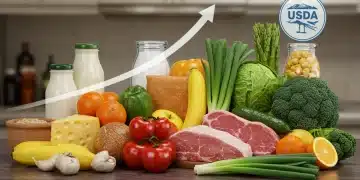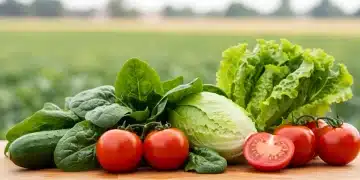Insights on nutrition benefit programs: unlocking your potential

Insights on nutrition benefit programs reveal their significant role in improving food access, enhancing health outcomes, and fostering community connections through support and education around healthy eating.
Insights on nutrition benefit programs can significantly change how we approach our daily health choices. Have you ever wondered how these programs could make your life better? Let’s explore what they offer and how you can benefit.
Understanding nutrition benefit programs
Understanding nutrition benefit programs can significantly affect your health and wellness journey. These programs are designed to help individuals access nutritious foods and improve their overall nutrition. By exploring how these programs work, you can take the first step towards a healthier lifestyle.
What Are Nutrition Benefit Programs?
Nutrition benefit programs provide assistance to individuals and families in accessing healthy foods. They are often government-funded and aim to reduce food insecurity while promoting better dietary habits.
- Supplemental Nutrition Assistance Program (SNAP)
- Women, Infants, and Children (WIC)
- School Meal Programs
- Community-based Nutrition Programs
Each of these programs offers a different type of support. For instance, the SNAP program helps eligible families purchase food with monthly benefits, while WIC focuses specifically on pregnant women and young children, providing them with healthy food options.
How Do These Programs Work?
To participate in these programs, individuals typically need to meet certain eligibility criteria based on income, family size, and other factors. Once enrolled, they can access benefits that allow them to buy healthy foods. Many programs work with local grocery stores and farmers’ markets to ensure that participants can find nutritious options nearby.
Not only do these programs provide financial assistance, but they also often include education on healthy eating and nutrition. This can empower individuals to make better food choices, potentially leading to improved health outcomes.
Benefits of Nutrition Programs
The impact of nutrition benefit programs goes beyond just providing food. They contribute to community health by:
- Reducing food shortages
- Improving access to fresh produce
- Enhancing the health of participants
Additionally, these programs can help decrease healthcare costs by promoting better nutrition and preventing diet-related diseases.
In conclusion, understanding nutrition benefit programs is crucial for individuals seeking to improve their dietary habits and overall health. By learning about the available support, you can take advantage of these resources to make healthier choices.
How to access available nutrition programs

Accessing available nutrition programs can be a simple process if you know what to look for. Many communities offer resources that can help you find and apply for these programs. Whether you are looking for assistance with food purchases or education on healthy eating, several steps can guide you.
Finding Nutrition Programs
The first step to accessing nutrition programs is to research what is available in your area. You can start by visiting local government websites, which often have sections dedicated to food assistance. These resources typically provide information on various programs, eligibility requirements, and application processes.
- Visit your state’s Department of Health or Human Services website.
- Check local food banks and community centers.
- Look for non-profit organizations focused on nutrition.
Many programs also advertise through social media and community events, making it easier to find out what’s available locally.
Eligibility Criteria
Most nutrition benefit programs have specific eligibility criteria that you must meet to qualify. This often includes income limits, residency requirements, and household size. Understanding these criteria can help you determine which programs you may be eligible for.
To apply, you may need to gather personal information such as proof of income, identification, and residency documentation. Some programs allow applications online, while others may require you to visit an office in person.
Application Process
The application process can vary depending on the program. Generally, it is straightforward and involves filling out a form with your information. Here’s how you can prepare:
- Gather necessary documents, such as pay stubs or tax returns.
- Complete the application form accurately.
- Submit your application either online or at a designated location.
After submitting, you should receive a response within a few weeks. If approved, you will be provided with information on how to access your benefits.
Utilizing nutrition programs can greatly enhance your access to healthy foods. By knowing where to look and understanding the application process, you are taking proactive steps toward better nutrition.
The impact of nutrition programs on communities
The impact of nutrition programs on communities is significant and multifaceted. These programs not only help individuals but can also transform entire neighborhoods by improving overall health and wellness. Understanding how they affect communities can shed light on their importance.
Enhancing Food Security
One of the primary benefits of nutrition programs is their ability to enhance food security. By providing access to healthy foods, programs like SNAP and WIC help families meet their nutritional needs. This means fewer families struggle with hunger and malnutrition, leading to healthier lifestyles.
- Increased access to fresh produce.
- Reduction in food deserts.
- Support for local farmers and markets.
When communities have food security, children and adults can focus on education and work instead of worrying about where their next meal will come from.
Improving Public Health
Nutrition programs play a crucial role in improving public health within communities. By encouraging healthy eating, these programs can significantly reduce the incidence of chronic diseases such as diabetes and heart disease. Community members learn about balanced diets and nutritional choices, which aids in disease prevention.
This education can lead to behavioral changes that benefit individuals and the broader community. Community health fairs, cooking classes, and workshops can facilitate this knowledge transfer, fostering an environment of health awareness.
Building Stronger Communities
When residents participate in nutrition programs, they often engage with their neighbors, leading to stronger community bonds. Interaction in food-related programs helps build networks among families and individuals. These connections can foster a sense of belonging and support.
Furthermore, community gardens and local food initiatives can bring people together. They encourage collaboration and shared goals, which enhance trust and cooperation among residents.
Ultimately, the impact of nutrition programs extends beyond just food assistance; they contribute to the social fabric of communities. By prioritizing nutrition, individuals and families can lead healthier lives, paving the way for stronger, more resilient communities.
Success stories from nutrition benefit program participants

Success stories from nutrition benefit program participants showcase the positive impact these programs can have on individuals and communities. Hearing about real experiences helps illustrate how access to resources can transform lives. These stories often highlight improvements in health, well-being, and financial stability.
Real-Life Transformations
Many individuals have found hope and support through nutrition programs. For instance, Sarah, a single mother of two, struggled to provide healthy meals before enrolling in a local WIC program. With the assistance she received, Sarah learned how to budget for groceries and prepare nutritious meals. Her children are now healthier and thriving, and she feels empowered to make better choices.
- Improved access to food led to better nutrition for families.
- Participants gain skills in cooking and meal planning.
- Increased community engagement through group activities.
Emily is another participant who benefited from a community nutrition program. After attending workshops, she changed her eating habits and lost weight. Emily now actively shares her journey with others, encouraging them to join the program and improve their health.
Building a Supportive Community
Success stories often mention the importance of community connections. Many participants form lasting friendships and find support through group activities. These relationships create a sense of belonging and motivate individuals to continue their journey toward better health. Community events, such as cooking classes or healthy eating seminars, often lead to new friendships and learning opportunities.
Furthermore, these programs empower participants to share their stories, inspiring others in similar situations. Stories of success not only celebrate individual achievements but also promote the benefits of community support in improving overall health.
Positive Impact on Future Generations
Through these stories, it becomes clear that nutrition benefit programs have a lasting impact. Many participants emphasize how their improved health has positively influenced their children. Parents engaged in these programs are more likely to pass on healthy eating habits to their families, creating a ripple effect of wellness.
Overall, the success stories from nutrition benefit program participants highlight the transformative potential of these resources. They remind us that access to proper nutrition can lead to healthier individuals and stronger communities.
FAQ – Frequently Asked Questions about Nutrition Benefit Programs
What are nutrition benefit programs?
Nutrition benefit programs provide assistance to individuals and families in accessing healthy foods and improving their nutrition.
Who is eligible for these programs?
Eligibility varies by program but generally includes factors like income level, household size, and residency status.
How can these programs impact community health?
These programs improve food security, reduce hunger, and lead to better overall health in communities by promoting healthy food access and education.
Can I share my success story about a nutrition benefit program?
Absolutely! Sharing your story can inspire others and highlight the positive impact these programs have on individuals and families.





